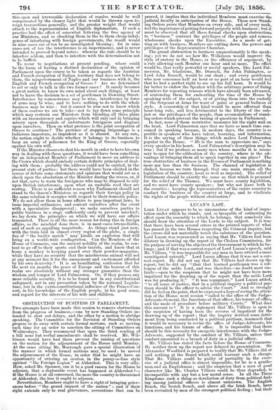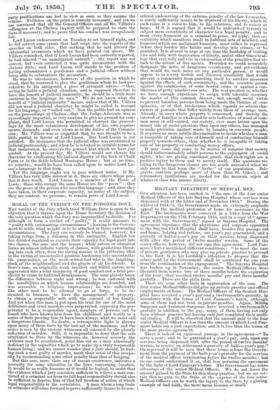LUCAN'S LAST.
Loan Luciar appears to be so unconscious of the kind of impu- tation under which he stands, and so incapable of estimating its effect upon the assembly to which he belongs, that somebody else i
should draw the attention of the Lords to the subject. It is true that there have been several errors in the printed reports of what has passed in the two Houses respecting the Crimean inquiry, but the errors did. not materially touch the substance of the question. Lord Lucan was represented as saying that Mr. Villiers had been dilatory in drawing up the report of the Chelsea Commission, for the purpose of serving the objects of the Government to which he be- longs ; and if that was a correct report of Lord Lucas's speech, said Mr. Villiers, " it was impossible for any man to have uttered a more unmitigated untruth." Lord Lucan affirms that it was not a. cor- rect report. He did not say that Mr. Villiers had drawn up' the report, but he did say "that that learned gentleman was a col- league of the noble Lord, and was therefore—no doubt most un- fairly—open to the suspicion that he might not have been more impatient for the drawing up of the report than the noble Lord. was for producing it." It was repugnant," Lord Liman. added, " to all sense of justice, that in a political inquiry a political par- tisan should be the officer to advise the Court." And so strongly did he feel on the point, that he expressed a hope of seeing the atten- tion of the House next session " called to the office of the judge- Advocate-General, the functions of that officer, his tenure of office, and the mode of procedure before military Courts." What does this amount to ? It is a statement that Mr. Villiers is open to the suspicion of having been the reverse of impatient for the drawing up of the report ; that the inquiry derived some detri- ment from being conducted by a political partisan, insomuch that it would be necessary to revise the office of Judge-Advocate,. his functions, and his tenure of office. It is impossible that there should be this necessity for energetic interference with the Judge- Advocate, suggested by the conduct of Mr. Villiers, unless that conduct amounted to a breath of duty in a judicial officer.
Mr. Villiers has stated the facts before the House of Commons. He neither drew up the report nor delayed its presentation. Sir Alexander Woodford is prepared to testify that Mr. Villiers did- or said nothing at the Board which could warrant such a charge. That Mr. Villiers could be guilty of partiality in the exer- cise of a judicial office is almost impossible, for. he is a gentle- man and an Englishman ; and the suspicion that a man of good character like Mr. Charles Villiers could be 'thus degraded,- is incompatible with any but a low moral sense. In all the Three. Kingdoms such a thing: as dereliction of duty from political feel- ing among judicial officers is almost unknown. The English Bench, the Scotch Bench, and above all the Irieh Bench, have been recruited by men of the strongest political feeling ; but their party predilections are lost to view as soon as they assume the ermine. Evidence on the point is scarcely necessary, and yet we are convinced that all the General Officers and all Mr. Villiers's colleagues at the Chelsea inquiry will be prepared to state the facts if necessary, and to prove that his conduct was scrupulously
fair.
Lord Lucan endeavoured on Tuesday to set himself right, and he did correct some errors that had crept into the reports of the speeches on both sides. But nothing that he said altered the substantial averments which we have pointed out above. Mr. Villiers remarked, that if Lord Lucan had been correctly reported, he had uttered " an unmitigated untruth " : the report was not correct, but even corrected it was quite inconsistent with the obvious facts ; and Lord Lucan still stands in the position of having calumniated a gentleman and a judicial officer without being able to substantiate the accusation.
He was so unconscious, however, of the position in which he stood, that he ventured to give the gentleman whom he had pro- voked to be his antagonist a piece of arrogant advice—" that, seeing he holds a judicial situation, and is supposed therefore to have the benefit of judicial immunity, he should be a little more cautious in the language he uses." We do not know what the benefit of "judicial immunity" means, unless that if Mr. Villiers did not wear a judicial character he might be called to account for his language, or " called out." Now the public had an opinion on the proceedings at Chelsea—that the Judge-Advocate was so exceedingly impartial, so very anxious to give nor ground for com- plaint, that Lord Lucan was permitted to obstruct the proceed- ings by the most voluminous development of his own require- ments, demands, and even views as to the duties of the Commis- sion ; Mr. Villiers was so impartial that he was thought to be a
little partial in favour of Lord Lucan. that Lord Lucan is not satisfied. He insinuates that the judicial office was prostituted to judicial partisanship ; and when he is rebuked in suitable terms for that insinuation, he conveys the genteel hint which we have just quoted. At the present d;:y, Mr. Villiers would not elevate his character by vindicating his judicial dignity at the back of Chalk Farm or in the fields behind Montagne House ; but at no time, we conceive, would he have been called upon to notice Lord Ln- can's language in that form.
Yet the language ought not to pass without notice. If Mr. Villiers has very little interest in it; there are others whose posi- tion it does touch. Lord Lucan is a member of the House of Lords : those who occupy the same House are his " peers " : they are the peers of the person who uses this language ; and since they have taken, in their corporate capacity, no notice of the subject, they are content, we presume, to remain peers of Lord Lucan.



























 Previous page
Previous page